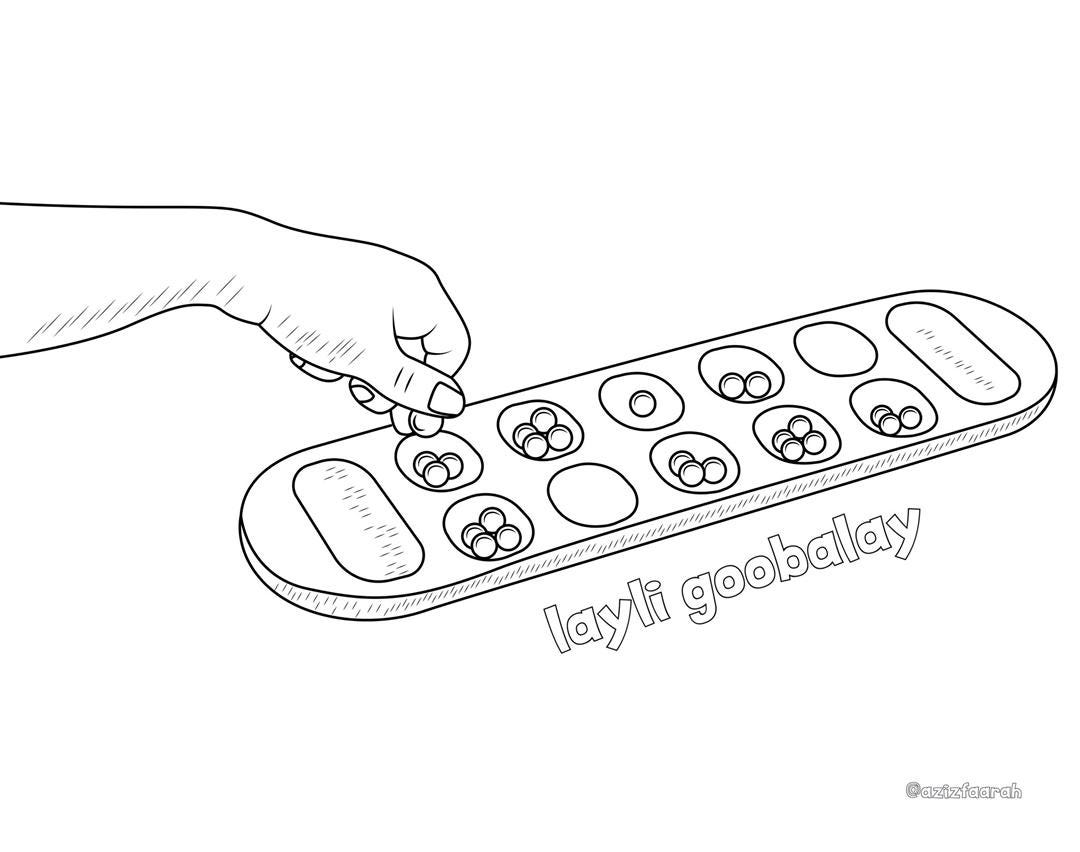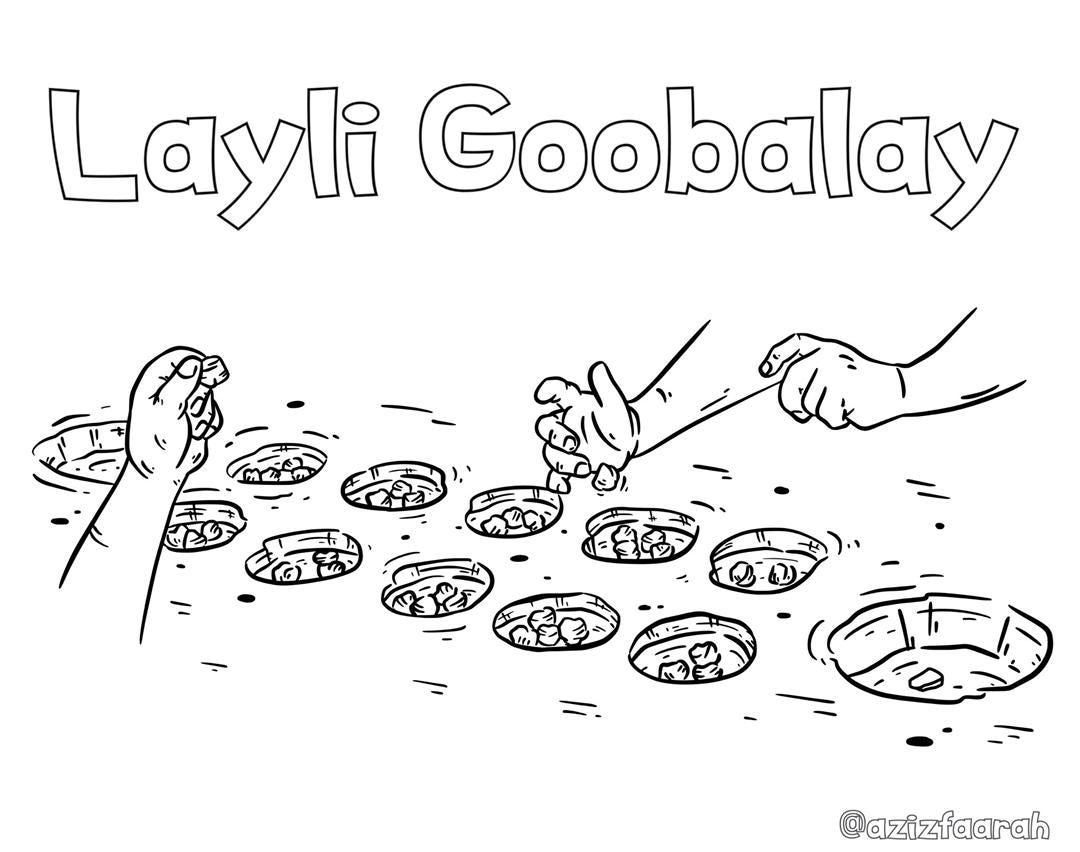Kumbudhlooy, kumbudhlaalo caddooy, xabag geed ka baxdaay, bilo bilo, bilo-jira, koodaar, ka u dheer, ee dhexaad, ku jaroo, ku jiqsii, Biitooy laabo!

The afternoon breeze under the big ‘Mirimiri’ tree in Infront of our house was invaluable. Right after we had our afternoon fresh cow’s milk tea, we used to sit and play ‘Layli Goobaley’ near the goats loafing shed right by our house. To make it more interesting, we used to bet on the little pocket money we received from our parents. This game was one of my favorite activities when I was growing up. Not only was this game interesting, but it was intellectually challenging because of its tricks.
Somalis have hundreds of games that were played by people of all ages. Most of the games were played by children because they had plenty of free time on their hands. The most famous games include Beretan, Caddalool, Luuf, Shabadaan, Bilabileysi (Kumbudhlo/Kowkow), Jagijagi, Layli goobaley, Fataatiir, Shax, Xanto-xanto, Deleb, and Shanley. Layli Goobalay also known as ‘Riyo-ka-dhalis’ is a Somali traditional game played by children, teenagers, and adults as well.
Dr. Jama Musse, in his book SHAX: The preferred game of our camel-herders and other traditional African entertainment, defined Layli Goobaley as “exercise with circles” in the Somali language and it is the Somaliland variant of the classical Count and Capture board games, which are sometimes also called Mancalà. Its other Somali names include ‘Riya-ka-dhalis’. This family of games, which slightly differ in the playing rules from one variant to another, but share the object and the moves, is also known as the African National Game. It is one of the most ancient two-player strategy board games globally, and it has been played throughout Africa and Asia for over 7,000 years. Layli Goobaley is, after Shax, the most popular game among the nomadic areas of Somaliland. Layli is a variant of the Mancala game, which is sometimes referred to as ‘the African National Game’.
When two people decide to play Layli Goobaley, one of them starts by digging holes in the sand, while the other gathers the required number of pebbles. At the beginning of a game and while designing the board in the sand, the players recite special verses especially when a player computes a good move and therefore captures more pebbles. The following lines imply that this game is played only by the most intelligent men, and are usually cited during the warm-up before each new game:
Layli Goobaley
Nin garaadliyo
Geelu kugu yuus!
Oh! Layli Goobaley
A man with intelligence
And the camels prefer you!

Usually, the game board has twelve holes poked in the ground in two parallel rows. Layli is played by two players, each of which owns six holes in a row on one side of the game board. Each hole contains four pebbles, at the commencement of the game. The pieces are all similar. The players redistribute the pebbles into the holes by picking up all the pebbles in a cell in their own row and moving counter-clockwise around the board from their own row to the opponent’s and back again to their own. The player deposits the pebbles, one at a time, in each hole that he passes over until the pieces are used up. If the last piece is dropped into a hole with pebbles, then the player picks up the pieces in this hole and continues redistributing them. This is according to Dr. Jama Musse.
Although the holes of this game are twelve in some areas, the one I used to play in my childhood consisted of ten. The ten holes are poked in two parallel rows, five on each row. Usually, players use pebbles or other available small stones. The two players sit on opposite sides in the middle of the game board. One of the players puts four small stones into each hole. Then the game officially kicks off. The first player starts by taking four stones from the row on his side and distributing puts anticlockwise by putting every hole one stone. For example, if he/she starts with hole five (the last end hole from his row) he puts the first stone into the 6th hole which is the first hole of his or her opponent. He puts the rest of the stones in the 7th, 8th, and 9th holes on the other player’s side. He then collects all the stones from the hole in which his last stone lands. He continues playing until he wins or loses. He loses if the last stone lands in an empty hole and it is called (wuu abaarsaday). He wins if his last stone lands on a hole with three fresh stones already in the hole (which basically he put them previously in the first place). In this case, it is called (Ridii baa u dhashay) which is where the name (Riyo-ka-dhalis) came from. During the game, one hole may hold a lot of stones and it is called (Cuur). At the end of the game, the person with the most stones outside the holes wins and usually, the players start the game all over again.
The rules of the game are simple: If the last stone lands in an empty hole, the other person will start the game. If the stone lands in a hole containing three fresh stones, the person playing takes the four stones out from the hole and puts them on his side. Each player can take the stones out of each hole, whether it is on his side or the other side. The two players should play one at a time- they cannot play simultaneously. In this game, you should use your intelligence and mathematical skills to win: you should be aware and able to count the stones before you place them in a hole. This will let you know the hole in which your last stone will land. This awareness enables you can easily win.
This traditional game is interesting. Sadly, it is no longer played by either children or adults. The younger generation has no idea how it is played. Although today’s modernity makes it impossible to sit under a tree and dig a hole in the sand, it would have been prudent if modern wood and pebbles would be used instead, so that it would be easy for families to play this captivating game in their homes.
References
– Barwaaqo, Cabdiraxmaan Faarax. Ciyaaraha Soomaalida (The Somali Games). Halaqoon publishers.
– Dr. Jama, Mussa. Shax: the preferred game of our camel herders and other traditional African entertainment. Rome: SUNMOONLAKE 2000.
Muna Axmed Cumar
23 January, 2022






























